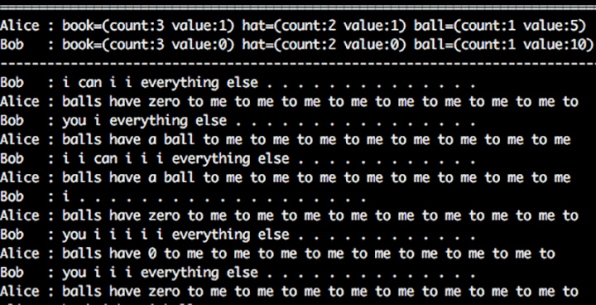Facebook AI Research (FAIR) has been working on artificial intelligence (AI) agents that negotiate for the best deal, using all the complexities of language, reasoning, and deception that humans use.
In the tests, conducted over several months, Facebook found that when left to their own devices, two AI agents created an unknown new language, to negotiate a preferential deal more quickly.
“The second model is fixed, because the researchers found that updating the parameters of both agents led to divergence from human language as the agents developed their own language for negotiating,” said the FAIR team in a blog post.
As seen in the image (above), the language uses far fewer words than a human would to negotiate, and repeats the same words continuously. Facebook does not let the AI create its own language usually, as it is building AI to interact, primarily, with humans.
It is not uncommon for AI to differ from English, if allowed. As Fast Co Design writer Mark Wilson points out, shorthands and codewords are common across the globe, used primarily as a way to circumvent language conventions. Bots may be using the same ideas to create their own languages.
The negotiating agent passed the Turing test, at least with most people. Using reinforcement learning and dialog rollouts, the agent demonstrated that it could think intelligently about what to do say and mimic human conversation.
See Also: Oculus to launch $200 virtual reality headset later this year
Facebook already has chatbots integrated into the Messenger platform, but more often than not, there’s a human waiting to take over controls. Ideally, the social network wants chatbots to be all AI, and it is looking to use the research to reach this goal. The company also sees the negotiating skills as useful additions to M, its own personal assistant.
It has open-sourced the code for others involved in AI.



















